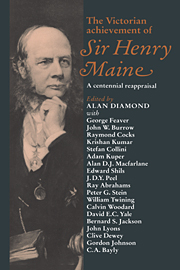Book contents
- Frontmatter
- Contents
- Notes on contributors
- Foreword by Sir John Lyons
- Introduction
- 1 The Victorian values of Sir Henry Maine
- PART 1 MAINE AND THE IDEA OF PROGRESS
- 2 Henry Maine and mid-Victorian ideas of progress
- 3 Maine, progress and theory
- 4 Maine and the theory of progress
- 5 Democracy and excitement: Maine's political pessimism
- PART 2 MAINE AND THE SOCIAL SCIENCES
- PART 3 MAINE ON LAW, LEGAL CHANGE AND LEGAL EDUCATION
- PART 4 MAINE AND INDIA
- Appendix: the conference programme
- Bibliography
- Index
4 - Maine and the theory of progress
Published online by Cambridge University Press: 04 September 2009
- Frontmatter
- Contents
- Notes on contributors
- Foreword by Sir John Lyons
- Introduction
- 1 The Victorian values of Sir Henry Maine
- PART 1 MAINE AND THE IDEA OF PROGRESS
- 2 Henry Maine and mid-Victorian ideas of progress
- 3 Maine, progress and theory
- 4 Maine and the theory of progress
- 5 Democracy and excitement: Maine's political pessimism
- PART 2 MAINE AND THE SOCIAL SCIENCES
- PART 3 MAINE ON LAW, LEGAL CHANGE AND LEGAL EDUCATION
- PART 4 MAINE AND INDIA
- Appendix: the conference programme
- Bibliography
- Index
Summary
As is well known, Maine's attitude to progress was complex and not entirely consistent. He was firm in his belief that there had been progress, but he was not clear how or why this had happened, nor — unlike some eminent contemporaries — was he confident that there was some general law of evolution which ensured the passage from a non-progressive to a progressive condition of society. Maine's use of the comparative method, and the generally positivistic or scientific bent of his approach, implied and perhaps even required some such general laws of social development (Burrow, 1966: 164). But this positivism — expressed at its clearest and most confident in his ‘Address to the University of Calcutta’ (1865) — warred with Maine's equally fervent devotion to the historical approach. The English scientist in him, with his desire to establish laws of society similar to those of the physical sciences, sat rather awkwardly alongside a German Romantic historicist who passionately insisted on the unique and the particular in the varied patterns of human social evolution.
The historical approach could show connection and continuity between past and present — could show this even between phenomena so apparently disparate as Indian communal customs, the practices of early Teutonic communities, Roman codes and English common law. It could document the fact of progress, the progress from a ‘closed’ to an ‘open’ society, from one based on ‘status’ to one based on ‘contract’, that could manifestly be shown to have occurred within Aryan civilization.
- Type
- Chapter
- Information
- The Victorian Achievement of Sir Henry MaineA Centennial Reappraisal, pp. 76 - 87Publisher: Cambridge University PressPrint publication year: 1991
- 1
- Cited by

